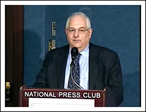|
PANEL DISCUSSION:
After AIG: New Rules
for Financial Sector Compensation?
March 27, 2009
.................................

View Panel Discussion (VIDEO)
.................................
Beyond the Meltdown: Regulatory Reform of the Financial Sector
|
BEYOND THE MELTDOWN: Regulatory Reform of the Financial Sector
January 9, 8-4 pm
National Press Club, Washington, DC
8:00 - 8:30 Breakfast and Welcome
VIDEO
8:30 - 10:00 PANEL #1
WHAT DOES MAIN STREET NEED FROM WALL STREET (AND FROM CAPITOL HILL)? The Role of the Financial Sector and Financial Regulation in the U.S. Economy
In 2007, financial services companies accounted for 27.4 percent of all of corporate America's profits. Finance has been the driving force in the U.S. economy throughout the decade, and the dominating influence in policy making. The current crisis suggests the need for re-thinking the role of financial institutions in the broader economy, careful examination of regulatory failures, and a reconsideration of regulatory first principles.
- What is the proper role of the financial sector in the economy?
- What led to comprehensive regulatory failure?
- What are the strengths and deficiencies of current watchdog agencies like the SEC?
- What new resources and powers does government need to regulate finance?
- What institutional structures and incentive arrangements will direct large
financial actors measures can encourage more self-regulation and corporate
responsibility, so that those actors who best understand finance have incentives to behave more prudently and ethically?
Panelists:
10:00 - 11:30 PANEL #2
TOO COMPLEX, TOO EXOTIC: Critical Perspectives on Financial "Innovation"
VIDEO
The last decade has seen extraordinary changes in the financial sector. Lauded over most of that
period, it is now clear that the development of complex and exotic instruments, involving very
high levels of leverage, an under-appreciation (and under-pricing) of risk, and opaque
transactional relationship, led to systemic cataclysm. This suggests that whatever the
firm-specific benefits of new instruments, the systemic risks may be far costlier, and that
presumptions about acceptability of new instruments and investment vehicles should be reversed.
- What social value is created by instruments such as credit default swaps and
other financial derivatives?
- Should these instruments be permitted?
- What regulatory criteria should be applied to assess existing instruments, and
new ones not yet invented?
- If exotic instruments are permitted, what kinds of controls - standards of
transparency, limits on leverage, skin in the game - should be applied?
Panelists
- Bob Kuttner, American Prospect: Moderator
- Robert Weissman, Essential Information
- Michael Barr, University of Michigan Law School
- Steve Kroll, American University, former Senate Banking Committee Staff
11:30 - 1:00 LUNCH
Interview with John C. Bogle, founder of the Vanguard Group and President of Vanguard's Bogle Financial Markets Research Center
VIDEO
1:00 - 2:30 PANEL #3
CHARTING A NEW COURSE: Regulation and Restructuring after the Cataclysm
VIDEO
The financial collapse was enabled by a regulatory collapse -- and not for the first time. The
failure of regulators to anticipate and head off the financial crisis is an amplified version of prior
failures with S&aLs and the accounting manipulations of Enron and related scandals. What is
different now is both the scale of the crisis and regulatory failure, and the more complex and
interconnected nature of the financial system. Broad regulatory principles are needed, but so too
are focused rules to address pervasive problems and address — and redress — new financial structures.
- How should the shadow banking sector be treated? How should it be brought
into the regulatory system?
- Should the credit ratings function be reserved for the government, or
independent nonprofit entities not paid directly by issuers?
- Is there an opportunity and rationale for reviving Glass-Steagall principles?
- What antitrust and competition policies should be applied as the financial sector
consolidates, and how and when?
- How would a financial transactions tax affect Wall Street behavior, and with
what impact?
Panelists:
- Bert Foer, American Antitrust Institute
- Robert Auerbach, Univ. of Texas, former House Fin. Services Staff.
- Dean Baker, Center on Economic and Policy Research
- Ed Mierzwinski, U.S. Public Interest Research Group: Moderator
2:30 - 4:00 PANEL #4
CHARTING A NEW COURSE: Consumer and Taxpayer Protections
VIDEO
From predatory sub-prime mortgages to credit card interest rate rip-offs, financial institutions
have exploited the consumers they exist to serve. Although it yielded hyper-profits for a time,
this exploitation has proved so unsustainable as to endanger the very existence of the perpetrating
institutions. Meaningful consumer protections thus may aid not only consumers, but the financial
system itself. Other interventions similarly may promise to reduce systemic risk by curbing
self-injuring behaviors of financial institutions.
- What powers and structure would a Financial Consumer Protection Agency
need to afford meaningful protections to consumers?
- What substantive protections should be afforded to consumers and taxpayers
- Can regulatory initiatives facilitate the banding together of financial consumers
into an independent organization with power and standing to combat financial
institution wrongdoing, and press for appropriate regulation?
Panelists:
- Tamara Draut, Vice President for Policy and Programs, Demos: Moderator
- Ellen Seidman, New America Foundation, former director Office of Thrift Supervision
- Jane D'Arista, Financial Markets Center
- Ralph Nader, consumer advocate
|
